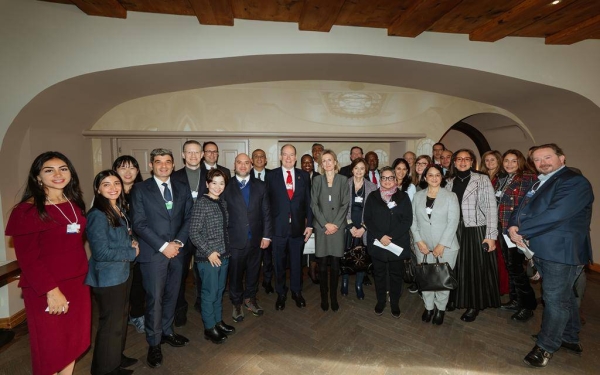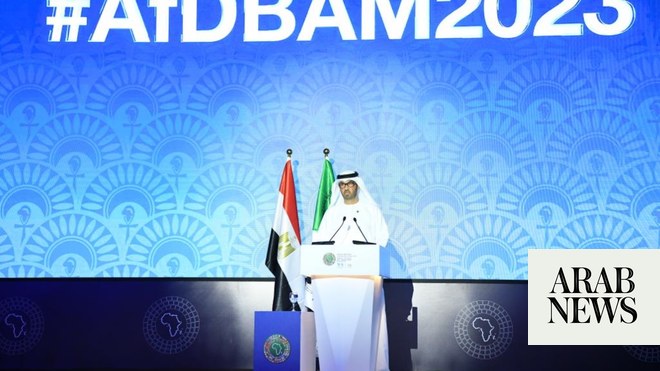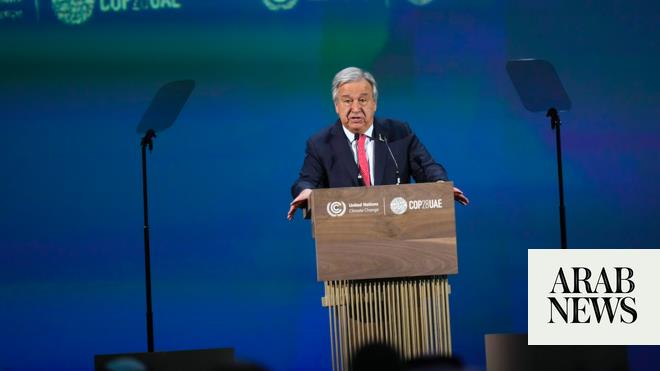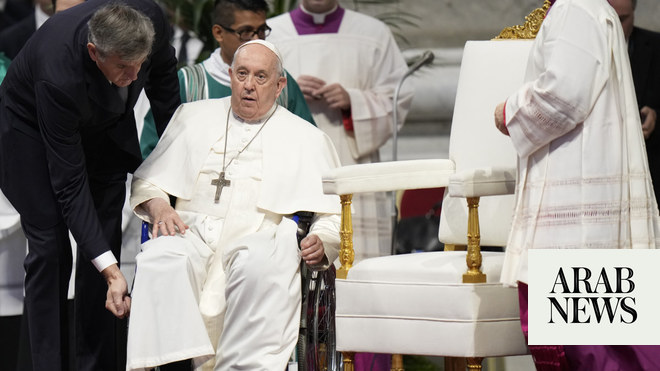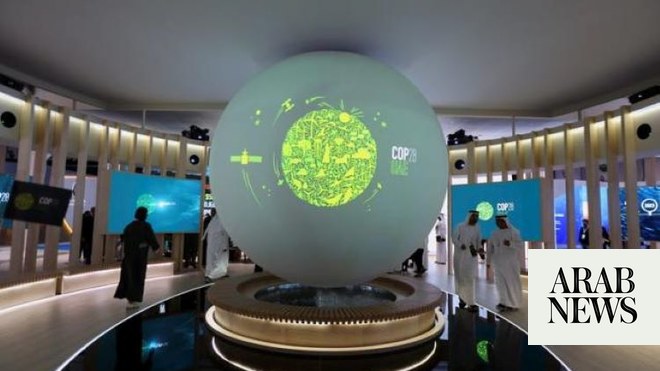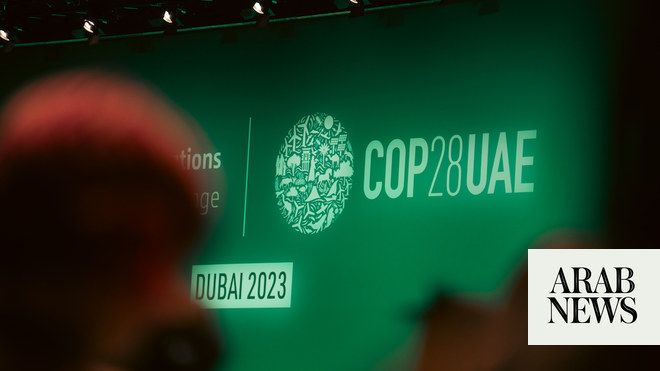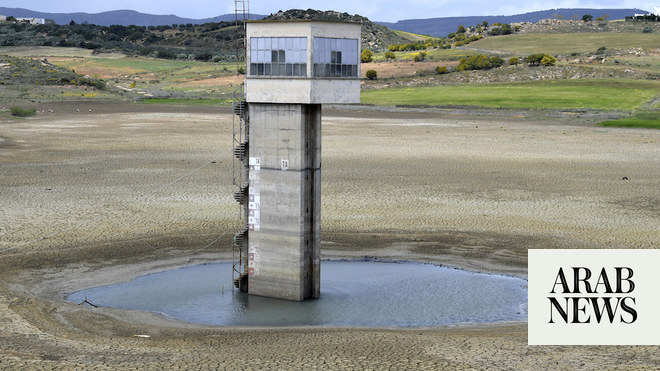
Novel solutions needed for multifaceted environmental challenges
Ecological, political, economic, social factors require consideration
DUBAI: In the early years of the 21st century, humanity finds itself confronted with an unparalleled environmental predicament: an intensified greenhouse effect fueling global warming and precipitous alterations in the delicate fabric of the climate system. Undeniably, this phenomenon stands as one of the most formidable challenges ever faced by our species. It defies resolution through the mere application of scientific knowledge, linear thinking, or analytical approaches alone.
As the 28th Conference of the Parties, or COP28, approaches, hosted by the UAE, it is important to acknowledge the value of such international platforms in addressing the region’s unique climate challenges and proposing innovative solutions through climate education.
Unlike the localized environmental issues of the past, wherein a single source of pollution caused readily identifiable consequences, today’s global environmental problems encompass a complex amalgamation of interwoven global and local dynamics. This intricate interplay involves ecological, political, economic, and social factors, necessitating novel strategies of learning and thinking to comprehend and address its multifaceted nature.
The recently released report “Advancing Regional Climate Education” by the Fiker Institute brings together the insights of two experts — Dr. Sonia Ben Jaafar, CEO of the Abdulla Al-Ghurair Foundation and Joe Y. Battikh, head of the Energy & Water Knowledge Hub at the International Committee of the Red Cross. Their efforts have resulted in a report that underscores the significance of climate education and offers practical solutions for advancing it.
Amidst this intricate landscape, the importance of climate education emerges as a critical catalyst for change. It is within this context that Ben Jaafar and Battikh’s report sheds light on the current state of climate education in the region, presenting a compelling case for transformative action. With their expertise in educational leadership, sustainability management, and a shared commitment to addressing the unique challenges faced by the Middle East and North Africa, the authors provide valuable insights for change.
They outlined the key elements of their work in an exclusive interview with Arab News recently.
The paradox of collaboration and localization
One of the key implications highlighted in the report is the importance of addressing region-specific issues. Ben Jaafar underscores the spotty nature of these solutions and advocates for a more comprehensive approach.
During the 2023 World Government Summit held in Dubai, stakeholders recognized the imperative of employing both top-down and bottom-up strategies to address the complexities of climate change. Ben Jaafar underlined the paradoxical nature of the situation, wherein fostering cross-border collaboration and knowledge-sharing is crucial, while concurrently respecting and empowering local communities. She emphasized the significance of collaborative efforts in establishing a novel framework that adapts to the present realities while encompassing future scenarios.
“It’s a paradox because we’re asking for these very big pieces and we’re asking for localization. And the only way that we’re going to move forward that was really clear at the summit is if we do that together. So I think that it’s significant because what we need is to work collaboratively while respecting local solutions and the ability for communities to solve their own issues. And that means creating the next kind of whatever this is going to look like in the future. Creating it and also adapting to the realities of right now,” said Ben Jaafar.
Battikh discussed their involvement with the Fiker Institute, an organization dedicated to amplifying the voice of West Asia and North Africa, and further highlighted the importance of regional representation in the fight against climate change.
He drew attention to the existence of multiple entities in close proximity within the region that are working on similar solutions, yet often lack awareness of each other’s efforts. This lack of awareness and communication hampers collaboration and the sharing of knowledge and resources. Moreover, he underscored the prevailing dependence on external catalysts or events from other countries to bring stakeholders together and facilitate collaboration in the region. Battikh emphasized the need to overcome this dependence and establish a self-driven approach to collaboration within the region.
By shedding light on this issue, Battikh effectively underscored the significance of nurturing internal coordination mechanisms and establishing platforms that actively encourage stakeholders to congregate and collectively address the multifaceted challenges posed by climate change. This compels people to recognize the necessity of cultivating a collaborative space where individuals and organizations can convene, exchange ideas, and synergistically work toward discovering solutions. The observed fragmentation within the region, if left unaddressed, not only limits opportunities for fruitful collaborations but also undermines the optimal allocation of resources.
In view of Battikh’s perspective, the forthcoming COP28 assumes a pivotal role in facilitating the realization of this collaborative framework. Battikh said that the event provides a significant platform for deliberating regional issues and proposing context-specific solutions. This aligns seamlessly with the report’s overarching emphasis on the imperative of addressing region-specific challenges in the context of education and training, thereby accentuating the need to incorporate diverse perspectives and insights into the collective endeavor to combat climate change.
Role of education in climate action
The pivotal role of education in addressing climate change is widely recognized as it equips individuals and communities with the necessary knowledge, skills, and behavioral changes needed for climate-resilient sustainable development. Education serves as a catalyst for informed decision-making and proactive engagement in climate action.
An important aspect of education is its potential to empower young people and future generations, enabling them to assume environmental leadership roles within their communities and drive inclusive adaptation efforts. It is through education and training that these individuals gain the expertise and know-how required to address climate challenges effectively.
In the context of climate action, educational institutions play a crucial role in driving scalable and effective adaptation programs. The Abdulla Al-Ghurair Foundation recognizes the significance of incorporating education into collaborative partnerships and supports initiatives that focus on green technologies, solar energy efficiency, and e-mobility in partnership with universities including the American University of Beirut. However, Ben Jaafar emphasized that going beyond the curriculum is essential, urging for the strengthening of research and development partnerships between industry and universities for accelerated progress in solving climate-related challenges.
The Abdulla Al-Ghurair Foundation has made significant investments in youth education, particularly in STEM fields — science, technology, engineering and mathematics — to align future-focused careers with the UN’s Sustainable Development Goals.
The report by the World Economic Forum on the potential of the green transition to create 30 million jobs in clean energy efficiency and low emission technologies by 2030 reinforces the link between climate action and socio-economic development. Ben Jaafar highlighted the opportunities for employment generation and addressing pressing issues such as high-water scarcity and unemployment in the region. This highlights the importance of integrating climate education and preparing future generations for the jobs of the future.
Ben Jaafar emphasized the importance of empowering young people to address community needs and solve their own issues by providing them with toolkits and knowledge related to solar power, green energy, and other STEM topics. This comprehensive approach contributes to building a workforce that prioritizes sustainability, he said.
“Nobody is ever going to care about your community, the way you care about your community, and nobody will ever understand the needs as much as you will understand those needs because you’re living in them. So creating a space for these young people to actually learn about solar power, energy, green energy, all these different topics embedded within STEM gives them the toolkits and the knowledge to be able to live in their communities and solve their own issues and solve their own community issues so that they can adapt, so that they can understand it,” Ben Jaafar said.
Ben Jaafar also mentioned the collaboration between the Abdulla Al-Ghurair Refugee Education Fund and the Makani centers, emphasizing their alignment with the UN’s SDGs and their focus on global innovation that addresses local community needs. One example highlighted in the report is the hydroponic rooftop gardens in the Jerash Camp, which provide valuable training opportunities for vulnerable young women and men. This training equips them with the skills to sustain and manage the gardens, creating new income-generating opportunities and addressing agricultural needs within the camp.
“The hydroponic rooftop gardens in the Jerash camp came out of a training session at the Makani center, but I don’t know that somebody in Toronto is going to understand that a hydroponic garden could actually save lives because it can actually produce what they need in that context. So making those kinds of connections to us is very important. And that’s why to me, you know, climate education in the region, for the region, is so incredibly important,” Ben Jaafar said.
“It’s not just about what we’ve done with the scholarships. It’s also what we’ve done with His Excellency’s Refugee Education Fund, you know, making sure that we have learners who have automotive technology for the hybrid technology, hybrid maintenance, things that are small like that, that allows them to have jobs. And we’ve done that through Luminous Technical University in Jordan, for example,” Ben Jaafar said.
“So I think, at least for me, what was important about this paper was to present these examples, and these were only select examples. We have so many more in the region. When the education is there and when the opportunity is there, there are so many intelligent individuals who, if given the space and the opportunity and the knowledge and the skills, they can actually create solutions.
“And that to me was the power of what we’ve been able to do with the foundation and the Refugee Education Fund. It is to be able to enable communities to rise above the challenges that they live in, be they conflict conditions, the refugee conditions or simply impoverished conditions. And I think that those are realities in the region that we just need to face head on,” Ben Jaafar added.
Battikh, supporting the notion that education institutions can contribute to climate-adaptation programs, pointed out the need to focus on curriculum integration, research and training. He mentioned the partnership between the ICRC and Grundfos, a major pump manufacturer, as an example of how collaboration and curriculum development can be mutually beneficial. The partnership involved training sessions for engineers from conflict-affected areas, facilitating knowledge exchange and feedback between academia and industry.
“During the first training session with Grundfos, we had 11 engineers coming from six countries around the world. So we had people from the Philippines, Myanmar, Iraq, Syria, Palestine, Afghanistan. And so they came here and they spent a week within the Grundfos workshop. And it was a two-way kind of conversation. So in a way, we developed the curriculum and we pushed it towards the students, but at the same time, the engineers gave feedback to us in terms of what kind of solutions they need from the ground. I think the fact that they work in specific conflict areas where there’s a specific need, which is different from what the industry is working on, (is) a unique setup for developing these curricula.”
Challenges in climate education and the need for adaptation
Ben Jaafar identified two major challenges hindering the advancement of climate education. The first is the rapid pace of change, requiring the education sector to respond quickly. The second challenge lies in the existing problems within the education sector itself, such as high rates of “learning poverty” and diverse situations across the region. She emphasized the need to view climate education as critical to the future and called for a shift in perception that sees it as an integral part of the curriculum, rather than an optional addition.
“We have serious challenges in education, period, writ large. Leave alone climate education in the region. We have an extremely high rate of learning poverty at 60 percent in the MENA region, which is essentially a 10-year-old kid who cannot read a text. We have extremely diverse situations in the region from those who invest a lot in education, to those who cannot. So being able to kind of look at climate education and say this is not an add-on, this is critical to our future, is one of the challenges that we have, to say that it is not this extra thing,” Ben Jaafar said.
Ben Jaafar referenced, as a viable proposition, the Green Education Partnership, an initiative aimed at providing schools in the UAE with a national framework to bolster climate education and foster youth engagement in environmental action. This partnership seeks to imbue schools with a green ethos by incorporating sustainability principles into their operations, curricula, teacher training programs, and wider systemic capabilities, while also forging connections with local communities. It sets ambitious targets and utilizes the COP28 platform as a catalyst to drive collaboration among various partners, including the UN Educational, Scientific and Cultural Organization, International Renewable Energy Agency, and the UN Children’s Fund.
She also drew attention to the need for concerted effort from academia, industry and government because their collective endeavors remain vital for realizing the SDGs and addressing the complex challenges posed by climate change. By fostering an ecosystem of collaboration, where knowledge is shared, research is disseminated, and policies are informed by evidence, the region can unlock its full potential in the pursuit of sustainable development.
“If higher education in particular, continues to isolate themselves, where they’re finding solutions and the industry keeps on being protective of their solutions for corporate reasons, we’re not going to move forward. We see this with generative AI and the very recent kind of very public statements regarding what the corporate sector wants in terms of regulation.
“I think that we have to create greater collaboration. We absolutely need to create platforms that are structured for collaboration so that they’re no longer accidental or relational in terms of if I have a professional relationship with a colleague, then they’ll listen, right? It should be more systematic. It should be a strategy that universities and higher education and R&D (research and development) centers should have together with the government, to be able to serve the common purpose,” Ben Jaafar said.
“When I look at common purpose, I look at the Sustainable Development Goals because I believe that was what we agreed on, right? We all agreed on those targets. And so we do have this common framework that we’ve agreed on and universities are coming up with solutions. They’re also training the next generation and the current generation because we do have lifelong learning becoming part of just the normative practices. Governments cannot come up with policies without appropriate research, without appropriate data and evidence. And we absolutely need those different stakeholders to work collaboratively,” Ben Jaafar added.
According to Battikh, one hindrance to effective implementation of climate adaptation solutions is the lack of connection between industries, research and development, and universities. He highlighted the importance of establishing platforms that bring together all stakeholders to integrate solutions, theories, and practical applications.
“Talking about climate adaptation or integrating climate adaptation to the curriculum today is a must because we need to come to the reality and face reality that climate change is here and it’s not going away. We need to adapt to it, especially as a region that will suffer from it. I mean, if you think about it, we’re expecting the decline in rainfall to hit 60 percent if we’re above 4 degrees Celsius. Knowing that our agriculture uses more than 80 percent of the water, there will be a big problem,” Battikh said.
Stressing the need to adopt more efficient agricultural practices and water-management strategies, Battikh pointed to the UAE’s exceptionally high water consumption per capita, and emphasized the importance of teaching current and future generations how to employ resources more efficiently.
“We need to adapt to how to do agriculture in a more efficient way, use our water in a more efficient way. The UAE uses like 570 liters of water per person per day, the highest in the world. On average we’re around 178 liters per day. It’s a reality that we need to teach this generation, next generations on how to adapt to climate change,” Battikh added.
There are discrepancies between countries that promote the SDGs but fail to implement governmental policies that reflect those goals. For instance, in the UAE and the GCC region, high water consumption per capita contrasts with the inadequate pricing of water that fails to reflect its true cost. Policy changes, including increased water tariffs, are imperative, but collaboration between organizations, academia, and industry is equally vital, he said.
Battikh illustrated the impact of climate change by highlighting the major drought experienced by Tunisia this year, and that responded by imposing restrictions on tap-water usage for agricultural purposes, car washes, and other activities until September. He criticized such measures for lacking the depth of a comprehensive policy that fosters adaptation or a viable solution. Merely imposing temporary restrictions does not address the underlying issue or provide long-term adaptation strategies. It is crucial to recognize that this is not an isolated incident, but rather a manifestation of a recurring pattern of diminishing rainfall, he said.
While policy measures are essential, Battikh argued that they should not be merely punitive or incentivizing in nature. Rather, they should be the outcome of collaborative efforts between organizations, academia and industry. The complexity and multifaceted nature of climate change and climate adaptation necessitate a holistic approach that considers diverse perspectives and expertise. There is no singular solution that can be universally applied, and it is imperative to acknowledge that addressing climate change and climate adaptation requires a comprehensive and collaborative effort.
Collaboration and financing
He said another critical aspect that demands attention is the financing of climate adaptation in conflict-affected countries. Historically, climate financing commitments made in previous COPs have largely overlooked countries in conflict. However, COP28 presents an opportunity to rectify this oversight. It was imperative to ensure that a portion of the financing dedicated to climate adaptation reaches conflict-affected nations.
“We need to focus on conflict areas, specifically, if you look at the least-developed or least-ready countries for climate change, 14 out of the 25 countries least ready for climate change are in conflict, which represents almost 60 percent. These countries already lack the capacity to adapt to climate change due to ongoing conflicts. The unique setup we have (with the Energy and Water Knowledge Hub) can address these issues. However, we also need to address how we finance climate adaptation in conflict-affected countries,” Battikh said.
While there may be political considerations regarding the distribution of funds, Battikh said that an effective approach could involve leveraging organizations. “We have a setup like the ICRC that is already building these solutions for climate adaptations for countries already in conflicts. So maybe that could be a party that could address that issue. And the fact that we can do that with Grundfos here, because the UAE, for example, is a hub for multinationals, could be a great setup.
“We work with Grundfos from the water perspective, but for the energy we work with Schneider Electric, which is another multinational, whose regional hub in the Middle East is in Dubai. So it’s a great place where we can kind of bring these private-sector players with academia and address them. And have this place as a platform to address these challenges and use COP28 as a platform, for example, for financing of these solutions as a climate adaptation,” Battikh said.
He added that a significant development that signals progress in climate education is the inclusion of an education pavilion at COP28. This pioneering initiative recognizes the importance of education in driving sustainable change and ensuring that climate education is embedded in formal curricula. The Ministry of Education in the UAE deserves credit for taking this step, Ben Jaafar said, as it brings together academia, schools, and other stakeholders under one roof. Such a platform fosters knowledge exchange, collaboration, and the development of innovative solutions to address climate change adaptation and mitigation.
Also, to strengthen the connection between academia and global climate strategies, the appointment of the head of sustainability for the American University of Sharjah as the Education Partnership Coordinator for COP28, was a significant milestone, Battikh added. This role would facilitate the engagement of universities and schools in the COP28 process, ensuring that education plays a crucial role in shaping national and global climate strategies.
Bringing together their distinct areas of expertise, Ben Jaafar and Battikh have produced a report that addresses the urgent need for tailored, regional climate education. They argue, quite convincingly, that by fostering collaboration, integrating education into the curriculum, and prioritizing adaptation efforts, stakeholders can build a sustainable and resilient future in the face of this century’s most compelling environmental challenge.





